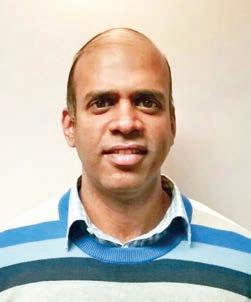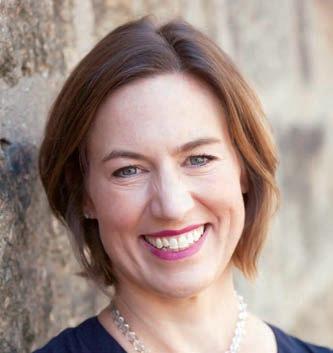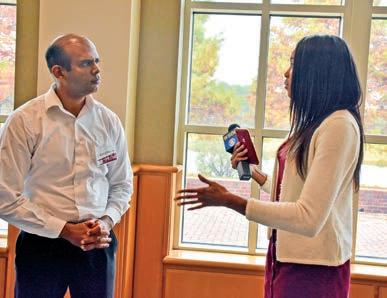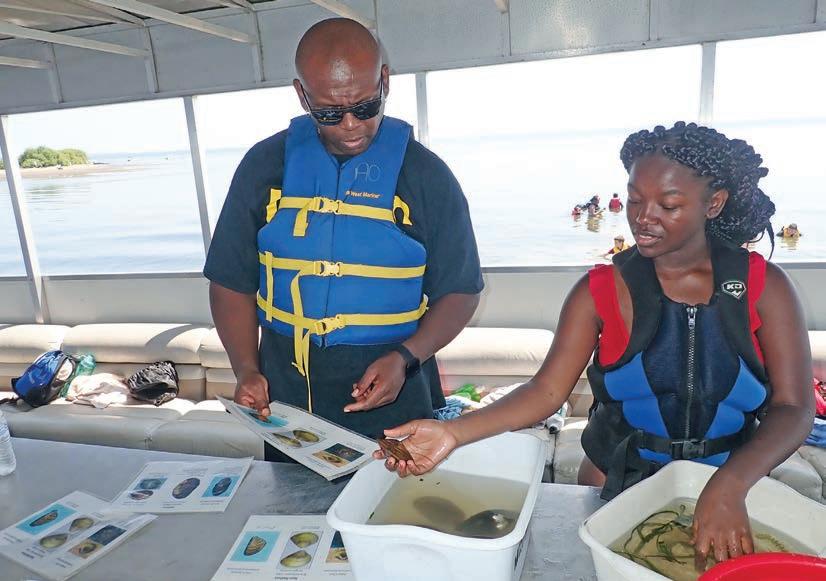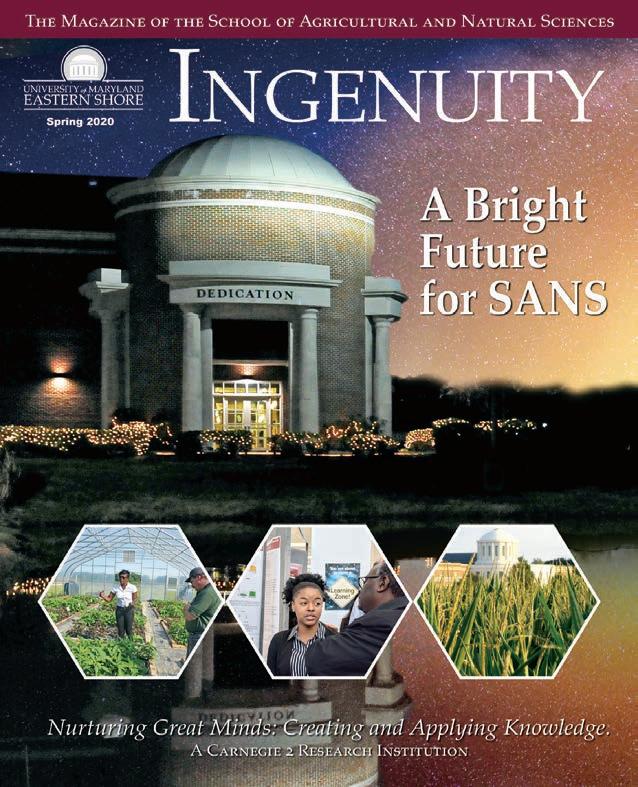
17 minute read
F aculty and Staff Focus
Khatabi Fronts Proteomics
Das lauded for research that includes undergraduate students
Dr. Behnam Khatabi was recently featured on the front cover of a prominent scientific journal. Not his likeness, per se, but a part of him just the same.
The editors of Proteomics: Proteomics and Systems Biology invited Khatabi et al. to write the article he titled “Plant-Microbe Symbiosis: What has Proteomics Taught Us?” for inclusion in the August 2019 edition of the journal. Upon reviewing it, they chose the schematic he created that compares the effects of various types of symbiotic and non-symbiotic interactions on a host plant as the cover photo.
“I am very pleased to have my graphic on the front cover of one of the best journals in protein chemistry in the world,” said Khatabi. Proteomics is published by Wiley VCH and has a 2018 ISI impact factor of 2.106. In 2015, the journal was ranked 13th out of 77 publications in “Biochemical Research Methods” by Thomson Reuters and reported an impact factor of 4.079. It was first published in 2001.
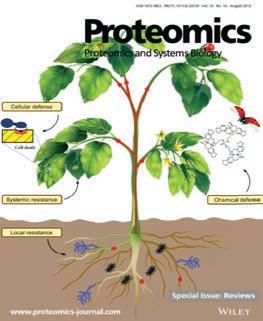
Dr. Kausiksankar Das (left) with two of the country’s pioneers in carbon nanotube and graphene research – Dr. Ray Baughman (center) and Dr. Ric Kaner (right).
“You are my hero by bringing frontier research to student experiments!” Dr. Ray Baughman, editor of the journal Science and a distinguished professor at the University of Texas, wrote those words to Dr. Kausiksankar Das.
Baughman’s praise came following the physics professor’s presentation of research findings at the Advanced Functional Materials Conference in Washington, D.C. and the Functional Materials Conference at the University of California, Los Angeles—both international events.
Das is especially devoted to teaching undergraduate students how to conduct high quality, cutting-edge research. “I am very impressed with Professor Das because of his enthusiasm in bringing science in novel ways to young people,” said Baughman. “His online videos are so attractive, showing plasma made using simple household items, for example. They all show simple configurations of household devices to teach young people that science is approachable, enjoyable, and thrilling.”
Baughman said that Das is able to communicate a “deep understanding of science and is innovative in showing how to accomplish complex science in simple ways.” He said he reminds him of someone in his life who, like Das, was inspiring to young people. Baughman recounted that in high school he was able to get a job at the University of Pittsburg because of Dr. George Jeffery, a structural crystallographer. Working with Jeffery, he said, was a “life changing experience” that inspired him to create the George A. Jeffrey NanoExplorers program in Jeffery’s honor following his death from Lou Gehrig’s disease in 2000 at the age of 84. The NanoExplorers program promotes nanotechnology-based education for high school sophomores and upper classmen.
Das received similar kudos from Dr. Ric Kaner, a professor at UCLA, who interacted with him during both conferences. Kaner was particularly impressed with the research Das presented on laser scribed graphene nano inductors.
“It’s very exciting work and follows up on some things we (researchers at UCLA) have done,” Kaner said. “I think it’s fantastic that he can do this while working mainly with undergraduates. He has really contributed a lot to the field and the development of different students.”
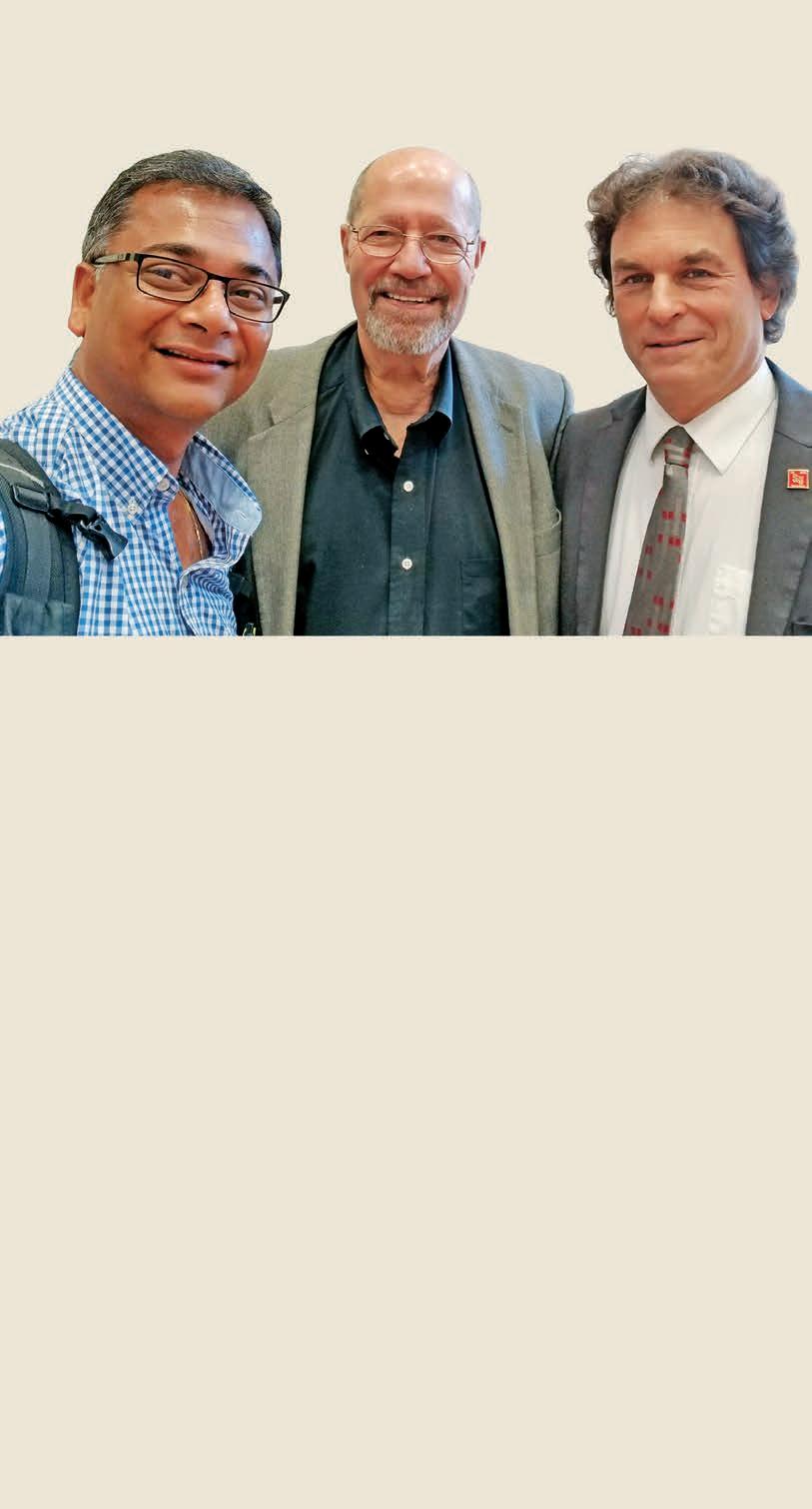
UMES researcher granted three quarters of a million dollars funding

Dr. Byungrok Min, assistant professor in UMES’ Center for Food Science Technology, was awarded a total of nearly $700,000 by the National Institute of Food and Agriculture’s 1890 Capacity Building Grant Program for two of his research projects.
His first project, “Development of Nutritionally Enhanced Corn Dried Distillers Grains with Solubles as Phytogenic Alternative to Antibiotic Growth in Broiler Production,” focuses on the use of nutritionally enhanced corn dried distillers grains (NE-DGGS) as an economically viable alternative to Antibiotic Growth Promoters. The project, which received $499,999 in funding over a 2-year period, looks to combat antibiotic resistance that is due to the use of many antimicrobial agents used in livestock feed. Min’s goal, he said, is to further research NE-DGGS as a means to stop the use of antibiotics in animal feed, resulting in less antibiotic resistance in agriculture and human populations. “Exploring Potential of Bioactive Phosphopeptide Production from Phosvitin in Hen’s Egg Yolk as a Novel Functional Ingredient,” is the second of Min’s projects to receive funding by USDA/ NIFA. The $200,000 research grant will go towards exploring novel ways to increase the utilization of the egg yolk. “Due to cholesterol and lipid concerns, many consumers underutilize the vitellus,” Min said. “However, phosvitin is a prominent protein found in the egg yolk
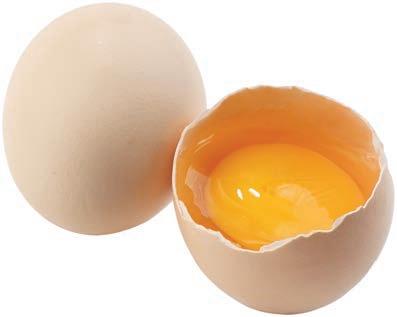
and has the potential to produce bioactive phosphopeptides. These products can be used in nutraceutical and pharmaceutical products in addition to preventing microbial growth in foods.”
With nearly three quarters of a million dollars in funding, Min aims to “solidify the sustainability of the egg industry in addition to improving animal health and contributing to global efforts against antibiotic resistance.”
Marsh Wins APLU Accolade
Dr. Lurline Marsh was among five regional recipients of the 2019 Excellence in College and University Teaching Awards for Food and Agricultural Sciences by the Association of Public and Land-Grant Universities System at its annual meeting in San Diego in November.
“Today, we recognize the extraordinary efforts of educators, teachers, researchers, leaders, and extension professionals whose science-based work creates a tremendous positive impact by helping their clientele seize the opportunities and overcome the challenges they face through advanced technology,” said Dr. Scott Angle, director, National Institute of Food and Agriculture, USDA.
The Excellence in College and University Teaching Awards recognize university faculty for engaging and preparing students for the future, he said. It recognizes individuals committed to programs in lifelong learning and contributions to improving communities.
“UMES has joined a distinguished list of universities being honored,” said Dr. Moses Kairo, dean, UMES School of Agricultural and Natural Sciences. “This award affirms the high quality of instruction provided at UMES and is truly reflective of the university’s push towards excellence. Without a doubt, Dr. Marsh touches and makes a difference in the lives of students every day. I salute her for her dedication and tremendous commitment to students.”
Marsh, a professor of horticulture at UMES over the past 15 years, has taught a range of courses including plant propagation, current issues in sustainable agriculture, crop physiology and ecology, international agriculture development, and the general education courses: Introduction to Plant Science and the First Year Experience Seminar. She includes teambased teaching with the collaboration of peers to complement her expertise and enrich her courses. Experiential learning is an integral part of her teaching, including her study abroad trips with students who affirm that the experiences improve their personal growth. Marsh has won over $4 million in collaborative teaching and research grants that support training, mentoring, and professional development of students at UMES. Across different agriculture disciplines, students hone their soft and disciplinary skills through these grants. Her research includes organic agriculture, food safety, soil health, and specialty crop and precision agriculture. Pictured, from left, at the awards ceremony are: Dr. Doug Steel APLU vice president, Food Agriculture and Natural Resources; Dr. Moses Kairo, dean, UMES School of Agricultural and Natural Sciences; Dr. Lurline Marsh, professor, UMES Department of Agriculture, Food and Resource Sciences; Dr. Scott Hutchins, USDA deputy undersecretary, Research, Education and Economics; and Dr. Juan Marcos Fernandez; chair APLU Academic Programs Committee on Organization and Policy (ACOP) and associate dean and director of Academic Programs, College of Agriculture, Purdue University.
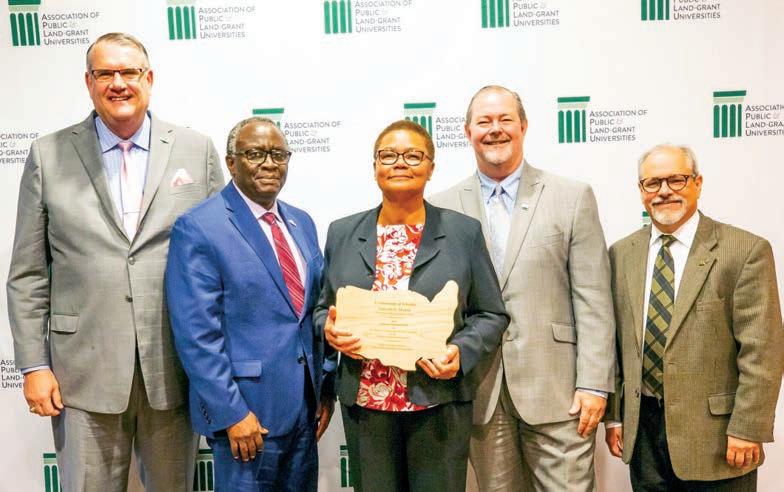
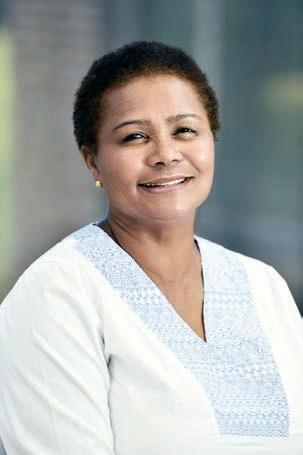
CHIGBU GRANTED WILSON H. ELKINS PROFESSORSHIP FOR FY 2020

Dr. Paulinus Chigbu, professor in the Department of Natural Sciences and director of the National Oceanic and Atmospheric Administration Living Marine Resources Cooperative Science Center (LMRCSC) at UMES, received a 2020 Wilson H. Elkins Professorship.
“The LMRCSC and the Department of Natural Sciences are researching the effects the environment has on what fish eat,” Chigbu said. “This funding will allow for us to continue observing the changes in the fish population in Maryland lagoons and the ocean.”
Of the 16 scholarship applicants, Chigbu is one of three recipients of the coveted award. He impressed the review committee with his plans to continue research focused on the environmental factors that influence fish recruitment and trophic dynamics. In addition, Chigbu’s efforts to continue the recruitment and the expansion of the Geosciences Bridge Program was a factor in the committee’s final review process. The Geosciences Bridge Program is an annual program to recruit rising college freshmen and provide them with a 6-week internship that focuses on educating students who plan to pursue a career in the natural and atmospheric sciences. It is supported by the LMRCSC.
The $70,000 in funding from the Wilson H. Elkins Professorship will allow Chigbu to continue conducting pertinent research involving local waterways and aid in supporting students in underrepresented communities.
Xia wins NSF research funding

Dr. Meng Xia, associate professor in the Department of Natural Sciences, is principal investigator for a grant project focusing on the Maryland Coastal Bays that received nearly half a million in funding by the National Science Foundation. The project is ongoing until the end of June 2022.
The research is titled, “Excellence in Research: Wave Effects on the Dynamics of a Multiple-Inlet Bay System During Storms.” It will benefit the broader field of physical oceanography by developing field-tested parameterizations for the modeling of wave effects and by expanding knowledge of wave effects to a new range of geometric scales and physical conditions, Xia said.
Xia’s research interests involve river plume and estuary dynamics; ecological, biogeochemistry, and larval transport process (TMDL) modeling; nearshore wavecurrent dynamics and sediment transport process; and river watershed modeling.
Parveen Honored Among USM Faculty

The University System of Maryland Board of Regents awarded Dr. Salina Parveen, professor of food science and technology at UMES, a 2018-19 Regents’ Faculty Award for Excellence in Research/ Scholarship/ Creative Activities. She was among four researchers to receive the honor recognizing research prowess. USM faculty also were singled out in the areas of excellence in teaching, public service, and mentoring.
Parveen’s award-winning research is aimed at improving the safety and quality of seafood and poultry, and to safeguard aquatic environments. Her research focuses on developing, evaluating, and validating rapid molecular immunological methods that aid in the detection of both food and waterborne pathogens like salmonella, vibrio and listeria. Parveen’s research findings have been adapted by the Food and Agriculture Organization of the United Nations, the World Health Organization, the Food and Drug Administration, and organizations in other countries to develop more accurate risk management practices.
She is currently conducting research on the prevalence, sources, persistence, growth/ survival, control, antibiotic resistance, pathogenicity, genomics, metagenomics, transcriptomics, and proteomics of major food and waterborne pathogens in seafood, poultry, meat, fresh produce, and in aquatic environments to better understand their sources, persistence, and control in food and water. As these pathogens have been responsible for several infections and outbreaks associated with the consumption of contaminated food, her team is also applying nanotechnology to establish regulatory guidelines for food and water (shellfish harvesting and irrigation) as information is limited about these guidelines. Pictured left to right are USM Chancellor Robert Caret, UMES President Heidi Anderson, Dr. Salina Parveen, and Board of Regents Chair Linda Gooden.
Khoza receives Carnegie fellowship
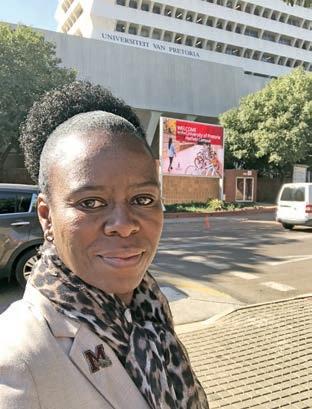
Dr. Lombuso Khoza, a professor in UMES’ Human Ecology Department and interim director of The Center for International Education, spent a month this past summer at the University of Pretoria, South Africa, for a Carnegie African Diaspora Fellowship she was awarded Fall 2018.
Khoza, along with her colleague, Dr. Nadine Sonnenberg of the University of Pretoria, worked on the project entitled, “Curriculum Co-Development for Sustainable Clothing and Textile Development Courses.” They visited four campuses and presented at three as part of their fellowship activities. During their time there, Khoza and Sonnenberg also hosted a workshop addressing curriculum gaps in textiles and apparel that was attended by participants from 10 institutions from South Africa and Eswatini. An abstract, “Insights derived from a curriculum codevelopment project for sustainable clothing and textile undergraduate courses,” was submitted and accepted for presentation at the 14th International South African Association of Family Ecology and Consumer Science Conference in March as a result of the experience, Khoza said. The theme of the annual event is “Sustainable Futures Through Consumer Science: Perspectives from the Global South in Pretoria. From left, Dr. Nadine Sonnenberg of the University of Pretoria is pictured with Dr. Lombuso Khoza of UMES.

Tenure and Promotion Congratulations
The School of Agricultural and Natural Sciences is pleased to announce that the following faculty members have received tenure and/or promotion 2017-2019:
Promotion to Full Professor:
Dr . Joseph Pitula Department of Natural Sciences
Tenure and Promotion to Associate Professor:
Dr. Donna Satterlee Department of Human Ecology
Dr. Simon Zebelo Department of Agriculture, Food and Resource Sciences Department of Natural Sciences
Tenure:
Zoumenou recognized among EFNEP peers
Dr. Virginie Zoumenou, professor of dietetics and nutrition and 1890 Nutrition and Health Programs director, will serve the USDA’s National Institute of Food and Agriculture’s Expanded Food and Nutrition Education Program in two leadership roles this year.
Her colleagues nominated her as an “Outstanding EFNEP Program Leader” and chose her from among them to serve as one of 15 “Program Leader Exemplars,” said Dr. Susan Baker, professor and extension specialist at Colorado State University and the EFNEP coordinator. The program leaders, she said, are a group of Supplemental Nutrition Assistance Program Education and EFNEP staff from 1862 and 1890 Land-Grant Universities working with the SNAP-Ed Program Development Team executive committee to develop core competencies for all job categories within their programs.
In this capacity, Baker said, Zoumenou will use the “Developing a Curriculum” process to create, validate, and confirm new core competencies or revise existing core competencies for four job categories: program leaders, program supervisors, professional educators, and paraprofessional educators.
Zoumenou will attend the 2020 national EFNEP meeting on March 2 in Arlington, Va., where she will begin her duties as a “Program Leader Exemplar.” She was selected based on a survey whereby peers nominated program leaders “who are experienced, well respected, and who might be described as outstanding by their colleagues.”
Zoumenou has been a faculty member at UMES since 2006. She develops and conducts Extension outreach programs and research projects emphasizing nutritional needs throughout the life cycle while targeting chronic disease prevention. For the past 10 years, she has provided leadership for three 1890 outreach nutrition and health programs: the Expanded Food and Nutrition Education Program, the Supplemental Nutrition Assistance Program, and the Family and Consumer Sciences Program. She also launched the UMES Center for Obesity Prevention and serves as its director.
As a faculty member, Zoumenou holds doctorates in biochemistry and nutrition (National University of Abidjan Côte d’Ivoire) and dietetics and nutrition (Florida International University). She has built strong collaborations with underserved communities; social services; and community based organizations at local, state, national, and international levels. In addition, she has been awarded more than $2.5 million through external funding. “It is not surprising that Dr. Zoumenou has been given such an accolade, because the quality of her programs and activities are hard to match. She is a unique asset to our UMES Extension Program,” said Dr. Nelson Escobar, interim associate administrator for Extension at UMES.
UMES Professors Author Unique Textbook on Bioenergy

Drs. Madhumi Mitra, biological and environmental sciences, and Abhijit Nagchaudhuri, engineering, have reached the pinnacle of a project 4 years in the making. Their textbook, “Practices and Perspectives in Sustainable Bioenergy: A Systems Thinking Approach,” is now available.
What makes the textbook standout, Mitra said, is that it is a contributed volume with each original chapter written by relevant experts in the respective fields of research and teaching in the areas of bioenergy, bioproducts, and sustainability. Diverse contributors include chemists; biologists; mechanical, chemical, and agricultural engineers; environmental scientists; physicists; and experts in business. UMES is represented not only by Mitra and Nagchaudhuri, but also by Drs. Kausiksankar Das, associate professor of physics; Monisha Das, associate professor of business, management, and accounting; and Dr. Xavier Henry, lecturer in aviation sciences, as well.
The book presents “a systems approach to bioenergy and provides a means to capture the complexity of bioenergy issues, including both direct and indirect impacts across the energy economy.” It addresses critical topics such as: systems thinking; sustainability; biomass; feedstocks of importance and relevance; anaerobic digestion and biogas; biopower and bioheat; and policies, economy, and rights to access to clean energy.
Each chapter includes a review with highlights of the key points, critical-thinking questions, and a glossary. “The open-ended questions create the opportunity for readers to hone their skills, explore, and think out of the box,” Mitra said.
Advanced undergraduates and graduate students can use it as a primary or secondary textbook in courses related to sustainable bioenergy and bioproducts. Researchers, professionals, and policy makers will also be able to use it for current reference materials.
A launch seminar with some of the interdisciplinary collaborators in attendance will be held at UMES on May 7 at 4 p.m. Another launch is slated for June at the annual meeting of the American Society of Engineering Education (ASEE) where Mitra and Nagchaudhuri have served in different capacities, including division chairs with the Energy Conversion and Conservation Division, one of the largest divisions of ASEE.
“All of us are very excited about this endeavor,” Mitra said. “We are thankful to the contributing authors for being patient and for believing in us that this would come to fruition.” The book is available at www.springer.com.
Dr. Sadanand Dhekney, associate professor of genetics and plant breeding, is co-author on the book, “Medicinal Plants: From Farm to Pharmacy.” The book includes 17 chapters written by experts in the field of medicinal plants cultivation, chemistry, and biomedical research and edited by Dhekney along with colleagues Nirmal Joshee of Fort Valley State University’s Agricultural Research Station and Prahlad Parajuli of Wayne State University’s Department of Neurosurgery. It has been called, “an important treatise that covers topics providing an excellent, in-depth review of the pipeline starting from the production, mechanistic studies and efficacy testing up to the time a plant-based product reaches the market.” “The book highlights the vast plant wealth around us and their tremendous benefit to both humans and animals,” Dhekney said.
It is suitable for people with a limited scientific background interested in knowing more about the effects of plants on human health, Dhekney said, along with students at both the undergraduate and graduate levels who wish to pursue a career in the field of medicinal plant chemistry and cultivation and researchers. “There has been an increasing trend in the commercial cultivation of medicinal and aromatic plants, and large-scale extraction of the active compounds, along with their processing and marketing as dietary supplements,” Dhekney said. “Chemical compounds with specific mode of action in the human body have also been discovered, tested, and produced as drugs. This trend has sparked the sharing of information across the world, providing impetus to research towards discovering potential life-saving drugs.”
The book, he said, provides timely information on techniques for the cultivation of plants with medicinal properties, in vitro studies detailing the effect of bioactive molecules from various plant species using the human/animal cell culture system as well as in vivo disease models and the processing of various plant parts for formulation into medicines. “My fellow editors and I hope this book will instigate some level of consciousness, enthusiasm, and gratitude towards the tremendous health benefits that are hidden in the flora surrounding us,” Dhekney said.
The book is available at www.springer.com. Dhekney Co-Authors Medicinal Plants Book
